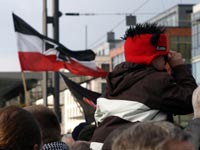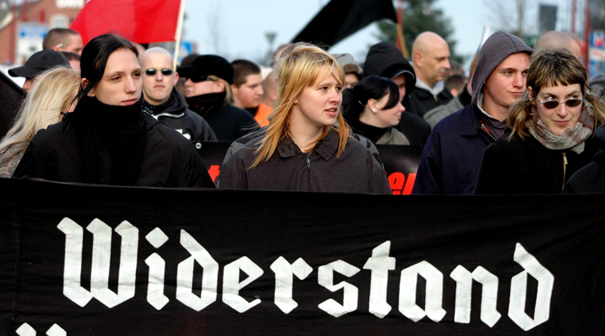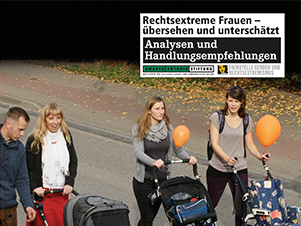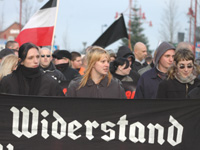An eastern German state is so worried about neo-Nazis trying to take over kindergartens that it has ordered teachers to vow allegiance to democracy. But that won’t tackle the underlying problem — the racist youths who assaulted immigrants in the 1990s are now parents intent on rearing little skinheads.
By David Crossland
The government of the eastern German state of Mecklenburg Western-Pomerania took the unusual step last month of ordering anyone setting up a children’s day-care center to pledge their support for Germany’s democratic constitution. The move followed a number of cases in which neo-Nazis had tried to take over the running of a kindergarten, influence teaching in nurseries or get recruited as teachers.
“I am concerned that right-wing extremists could become managers of kindergartens,” said Manuela Schleswig, the state’s social affairs minister. Effective August 1, all managers setting up new nurseries or taking over existing ones in the state have been required to declare that they and their staff subscribe to the principles of democracy.
The announcement conjured up dark visions of neo-Nazi pied pipers teaching toddlers the Hitler salute. While such fears are exaggerated, and incidents have been isolated, anti-Nazi campaigners say they have indeed detected a new and disturbing phenomenon: the attempted indoctrination of young children by teachers and parents in the former communist east, which continues to grapple with a strong neo-Nazi presence even after more than a decade of government policies to counter the problem.
Schleswig’s decree followed a widely reported case in February when the village of Bartow in the northeast of the state almost permitted a father of seven to take over a kindergarten which had been on the verge of closing due to a lack of funds. The man had agreed to run it free of charge. When the mayor checked out his credentials, he found out that he was a member of the far-right National Democratic Party (NPD), which glorifies the Third Reich. He politely declined the offer.
Racist Books in Nurseries
Anti-racism activists say there has been a growing incidence of far-right members either training to be kindergarten carers or attempting to influence nurseries — for example parents bringing in racist books or demanding that photos of immigrant children be removed from the walls.
Concern is also growing that in some thinly populated regions there may be enough neo-Nazi parents to secure a majority on parent boards.
“Within the far-right scene there appears to be a more or less clear strategy to encourage young women to train for teaching and social work jobs because that offers an opportunity to spread nationalist ideology,” Heike Radvan, an educational scientist at the Berlin-based Amadeu Antonio Foundation, an anti-racism group, told SPIEGEL ONLINE.
“This is an observation we have made over the long term, and the trend seems to be increasing.”
An editorial in Deutsche Stimme (the German Voice), the newspaper of the NPD, published in April encouraged members to go into teaching to promote “nationalist education” for young Germans.
NPD spokesman Klaus Beier said on Tuesday that the party wasn’t actively lobbying its members to become kindergarten and nursery teachers. “But of course it is quite natural and normal that NPD members and sympathizers should want to get involved in these areas. Kindergartens and schools should be politically neutral but unfortunately they are being instrumentalized by left-wingers,” Beier told SPIEGEL ONLINE.
The party’s regional organisation in Mecklenburg said in a statement in July that efforts underway to counter far-right influence in kindergartens amounted to “politically correct brainwashing” of children. “The parents will find ways to prevent this kind of re-education,” the statement said.
Analysts doubt whether the neo-Nazi scene is pursuing a deliberate long-term indoctrination strategy. They say the debate about extremists in kindergartens is detracting from the far bigger problem of toddlers being influenced by their own far-right parents.
A New Generation
The youths who made international headlines by assaulting immigrants and asylum-seekers in the 1990s have had children, and are demanding a say in their education.
The prospect of a second generation of eastern neo-Nazis has dashed any lingering hopes that the upsurge in far-right support following German unification in 1990 might have been a temporary phenomenon caused by the collapse of the eastern economy and the resulting social upheaval and mass unemployment.
“A generation socialized in the far-right scene in the 1990s has now had children and we have to deal with the phenomenon of children of right-wing extremists in nurseries and schools,” Friedemann Bringt, who advises local authorities in the eastern state of Saxony on how to cope with far-right intimidation, told SPIEGEL ONLINE.
“Right-wing extremism has become embedded in eastern Germany since the 1990s and has a stable voter base.”
It is a depressing trend for anti-racism campaigners and government officials who have run programs to combat racism and neo-Nazism in the region since the 1990s.
Analysts said far-right views remain endemic in the east because decades of authoritarian rule until the fall of the Berlin Wall had made the region fertile ground for right-wing ideology. The problem was compounded by East Germany’s education system, which failed to instill a sense of national responsibility for the crimes of the Nazis.
“Far-right thinking is commonplace in many regions of eastern Germany and many people don’t view it as extremist,” Bernd Wagner, a prominent analyst of the far-right who co-founded EXIT, a group that helps neo-Nazis quit the scene, told SPIEGEL ONLINE.
“Many people — normal citizens, not just youths — view racial ideologies as common sense,” Wagner said. “The view that races are embroiled in a battle for survival is widespread. It’s social Darwinism. People view strangers as a potential threat that must be driven away.”
Teaching the Teachers
Activists say teachers need better training on how to spot far-right parents and how to counter any attempts by them to influence their work. The Amadeu Antonio Foundation, named after an Angolan immigrant who was murdered by neo-Nazis in the town of Eberswalde near Berlin in November 1990, is running a training course for teachers in the northeastern town of Ludwigslust.
“We show how to identify extremist parents by their clothing. Teachers need to know that they can set up a code of conduct for the nursery and simply evict parents who don’t stick to the rules,” Sandra Pingel-Schliemann, one of the project’s coaches, told SPIEGEL ONLINE.
“We get reports of constant confrontation with far-right people in some nurseries. One has to ask oneself what happens in the minds of little children who grow up with an ideology of hatred at home and then come to the nursery where they are taught exactly the opposite.
“We have noticed that the children of far-right parents tend to be very uncommunicative. When you ask them on a Monday what they did that weekend they won’t tell you.”
Swastika Cakes and Kids Called ‘Odin’
In some cases far-right parents can be identified by the Nordic names they call their children. “Some parents bring in children and say their child is called ‘Odin’ or ‘Heil Odin,’ says Heike Radvan, the education scientist. Nordic mythology is popular with Nazis and “Odin” is the name of one of its main gods.
Radvan also said she had heard of one mother who opposed a school calling itself “School Without Racism” and posted a recipe for a swastika-shaped cake on her home page.
Some parents try to curry favor with nurseries by providing unpaid help. “There are cases where mothers in a first step get involved in the nursery, for example by helping to build a playground,” said Radvan. “But then it becomes clear that they’re trying to bring in ideology. They may bring in a racist children’s book, for example. Or they might argue that a picture should be removed from the wall because it shows an immigrant child.”
Eastern Germany has been dogged by right-wing extremism ever since the fall of the Berlin Wall. Attacks on Jewish property and racist assaults on ethnic minorities are still commonplace in the region.
Assaults on people of dark skin color have become so frequent that immigrant groups have labelled parts of the east as “no-go areas”. Police recorded 891 far-right assaults in Germany in 2009, of which 351 were deemed racist and a further 31 anti-Semitic, according to the 2009 report of domestic intelligence service, the Office for the Protection of the Constitution (BfV). The statistics show that on a per capita basis, the incidence of attacks is highest in eastern regions.
The total of recorded far-right crimes in 2009 was 18,750, including offenses such as arson, daubing swastikas on headstones in Jewish cemeteries or smashing the windows of takeaway restaurants run by immigrants.
The NPD openly espouses Nazi ideology but also benefits from Germany’s liberal laws on freedom of speech and is a legitimate party — despite a failed attempt in the past by the federal government to ban it — which entitles it to public funding.
The Office for the Protection of the Constitution describes it as a “racist, anti-Semitic, revisionist” party bent on removing democracy and forming a Fourth Reich. It has seats in the regional parliaments of Mecklenburg-Western Pomerania and Saxony.
‘Time to Tackle the Parents’
So far none of Germany’s 15 other regional states has said it plans to issue a similar decree ordering nursery operators to sign up to the constitution. And several anti-racism campaigners said it wouldn’t help.
“I think it’s nonsense and totally exaggerated to respond by issuing such a rule,” said Wagner, the former police officer who co-founded EXIT. “It won’t have any impact because any NPD member would simply sign a pledge to the democratic constitution.
“Besides, what about the far-right parents who bring their children to the nursery? We urgently needed to address the welfare of children who grow up in such families and find out what scope local authorities have to deal with that.”
But amid all the gloom, there are some rays of hope, said Bringt, the anti-Nazi campaigner who runs an advice center in Dresden.
“I’ve got a positive feeling because we here in Saxony have launched some 120 pro-democracy initiatives over the last 10 years. That’s how I measure success. Victims of neo-Nazis know now that there are advice centers they can go to. And local authorities have set up structures for tackling the problem. But it’s a phenomenon that will take a very long time to combat.”
Articel first published on SPIEGEL ONLINE, 2010 Sep 9th



